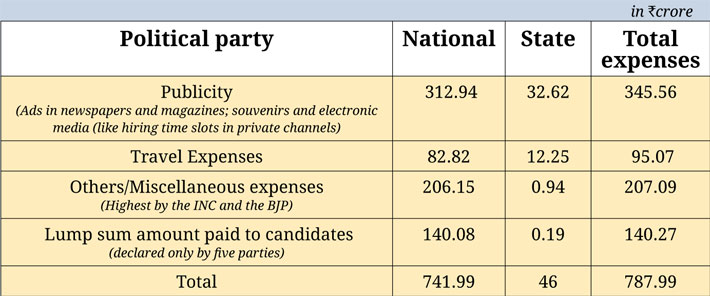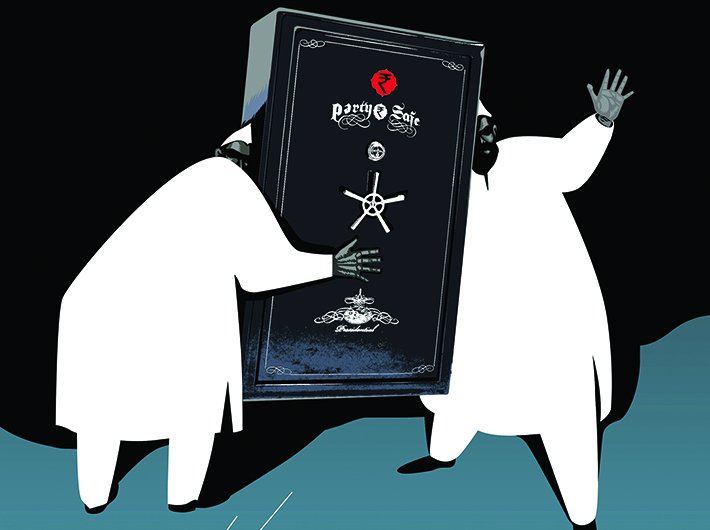Escalating election expenses is antithetical to democracy. A look at how parties raised and spent funds in the seven state assembly elections of 2012
India Today conducted a cash-for-vote sting operation in the recent assembly polls which revealed how candidates were blatantly violating election commission (EC) guidelines by bribing voters. It also exposed large amounts of money being spent in campaigning as some leaders admitted to spending several crores, while the EC limit is Rs 20-28 lakh per candidate. This picks holes in the government’s claims of cleaning electoral funding through demonetisation and assorted budgetary provisions.
In India, all citizens have a statutory right to contest elections which flows from the Representation of the Peoples Act, 1951. But due to increasingly expensive elections, only the rich, the elite, and those who can get funds (via corporate patronage, for example) are able to exercise this right. This is substantiated by the fact that 82 percent of MPs in the 16th Lok Sabha and 78 percent of the MLAs elected in this year’s five state elections are crorepatis. More often than not parties prefer candidates who can bring in a combination of factors like winnability (partially dependent on caste and community profile), ability to self-finance their campaigns, and the heft to enrich party coffers either by donating their own money or by generating it through their network.
A democracy of this sort, where systemic barriers deprive a majority of the population from participating in the electoral process, is close to being dysfunctional.
Political parties are not revenue generating entities per se. Their income is predominantly from contributions by corporates/electoral trusts, individuals and party members themselves. Yet they are able to contest and spend millions, even billions, during elections besides incurring expenses on daily operations, publicity and advertisement, travel, meetings, rallies, etc., throughout the year.
An analysis of the income tax returns of the national political parties (excluding the BJP), between 2004-05 and 2014-15, shows that they have spent Rs 2,477 crore on elections. This is 33 percent of their total expenditure in 11 years. Some parties like the INC, the NCP and the CPI have spent the largest share of their income on elections. Since the BJP has not mentioned any such category in its income tax returns for 11 years, despite contesting elections on a regular basis, we assume that its expenditure on publicity and advertisement, which is Rs 1,151 crore (also the highest amongst all its expenses), and Rs 157.96 crore on morcha/rally/andolan, constitute a major portion of its election expenses. This is close to 53 percent of its total expenditure in 11 years.
Escalating costs of elections pressurises candidates and parties to raise large amounts of campaign funds to win the electoral battle, subsequently resulting in corruption and misgovernance, as donors need to be refunded and rewarded for their generosity once the candidate has won. Also, expensive elections benefit big donors like corporates, as it helps them exert a substantial degree of control over political parties and the agendas that they pursue.
To get a glimpse of how much money flows through this entire process and to ascertain the expenditure priorities of political parties during elections, we have analysed the election expenditure statements submitted by all recognised parties during the seven state assembly elections in 2012. These are the same states that have gone or will be going to polls this year – Uttar Pradesh, Punjab, Uttarakhand, Goa, Manipur, Gujarat and Himachal Pradesh.
How parties make money and how they spend it
Political parties are required to submit a statement of election expenditure, providing information of total funds collected (in the form of cash, cheque/DD and in-kind/bank interest) and total expenses incurred (in cash, cheque/DD and the amount remaining unpaid) between date of announcement and completion of elections to the EC within 75 days of assembly elections.
A total of 24 national and state recognised political parties contested in the seven state assembly elections held in 2012. Out of the total 88 times that they contested, they have not submitted their election expenditure statements on 36 occasions, to the EC, till date. The list of defaulters includes some major players like the AITC, the JDU and Shiv Sena.
Funds collected
Political parties collect funds during election campaigns for publicity, travel, miscellaneous expenses and for the lump sum amount paid to candidates by parties. However, the details of these donors are not available in the public domain as there is no such rule obligating political parties to do so. As a result, like all other elections in India, we have no idea from where parties collected a total of Rs 727.11 crore for all the seven state assembly elections (average Rs 103.87 crore). What is more distressing is that parties collected 52.95 percent of these funds (Rs 384.97 crore), in cash. Due to absence of a money trail in cash donations, there is no way a donor can be traced. Experts believe that election funding is the breeding ground of black money because of the anonymity that donors enjoy.

In 2012, parties were expected to report to the EC, funds collected and expenses incurred at the national/central headquarters, state unit level, and district level. Parties collected 61 percent of their total funds (Rs 443.6 crore) at the central level, which was more than what they collected from all their state units put together. This shows that parties are less dependent on local donors.
Among state units, top three states with highest amounts collected were: Gujarat (Rs 125.55 crore), Uttar Pradesh (Rs 72.61 crore) and Punjab (Rs 44.72 crore). The collection from these three state units constitutes 85.67% of the total collection for all seven state units.

Expenditure incurred
Unlike the curbs on expenditure by candidates, there is no limit on expenditure incurred by political parties during elections. All parties together spent a whopping Rs 794.78 crore (average Rs 113.54 crore). Moreover, this amount excludes expenses incurred by unrecognised parties and individual candidates. Just like funds collection, expenditure incurred is also concentrated at the central headquarters from where reportedly Rs 436.52 crore has been spent.

Gujarat witnessed the most expensive election, where political parties spent Rs 197.58 crore, followed by Uttar Pradesh (Rs 74.68 crore) and Punjab (Rs 45.81 crore). The BJP incurred its highest expenditure in Gujarat, which was 133 percent higher than the funds it had collected through its state unit there. This proves how much the BJP values electoral victory in Gujarat given also the fact that it has collected the highest donations from there.
Recommendations
The supreme court has, in many of its judgments, observed that the current legal provisions are not sufficient to hold political parties accountable for the funds collected and the expenditure incurred during elections. It voices concerns that elections are now being contested on the might of monies which may have been obtained from illegal sources, including of the people and the corporates having vested interests, thus jeopardising the fairness of the electoral process.
The Association for Democratic Reforms (ADR) has filed a public interest litigation in the Delhi high court requesting it to issue directions for the implementation of the 170th Law Commission’s report which has recommendations regarding monitoring and regulation of expenditure by political parties.
In the same petition, ADR proposed three other recommendations: introduction of a ceiling on election expenditure incurred by political parties, on and during elections; direction to political parties to submit election expenditure statements one year prior to the date of announcements of elections (both Lok Sabha and assembly elections); and increase the frequency of submission of expenditure statements during the election period – once a month before declaration of elections and at least once a week during the election period.
Rawat and Singh are researchers with the Association for Democratic Reforms.
(The article appears in the April 16-30, 2017 issue of Governance Now)
